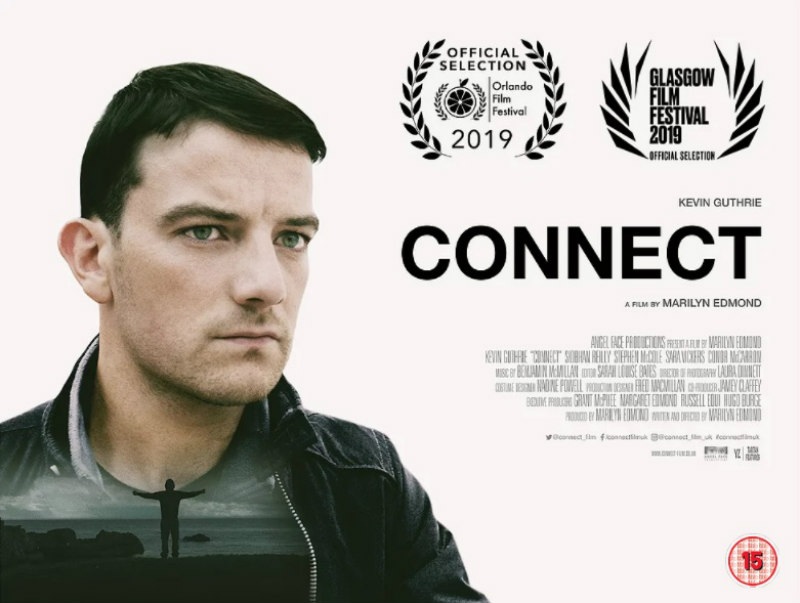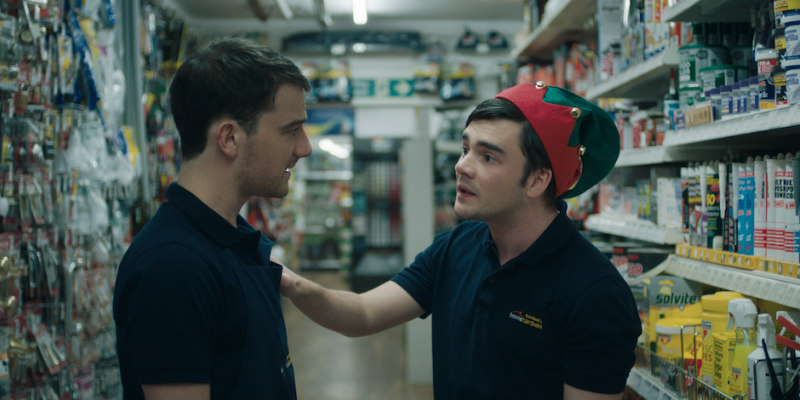
Review by Benjamin Poole
Directed by: Marilyn Edmond
Starring: Kevin Guthrie, Siobhan Reilly, Stephen McCole, Sara Vickers

The central character of Marilyn Edward’s earnest exploration of mental health is a lonely white male passively ambling towards his mid-life. Besieged by past tragedy, and with an infirm mother, the protagonist faces everyday cruelty which serves to negatively exacerbate his already tenuous grip on reality... Sound familiar? The probability of picking a joker from an average deck of cards is one in 54, but what are the chances of pulling two in a row, MurRAY?! The comparison is a worthwhile one, however, because while this month’s other film about male mental illness is an empty, pointless fan-fiction, Connect contrasts big budget folly with consideration, sensitivity and heart.


Following an enigmatic sequence of someone elegantly throwing themselves off a cliff, we open proper with Brian (Kevin Guthrie) waking to the shrill pulse of his alarm tone before going about the start of his day. There really is nothing like depicting a morning routine to establish a tone of grey drudgery, nothing like getting up and getting ready to remind us that our lives really are not our own. And thus, Brian trudges through his life, barely coping after the suicide of someone close to him. He visits his poor old mum in the Care Home, occasionally plucks some dirge or another on his guitar (yikes) and fixates upon the kindly and pretty nurse who sees to his mother (Sam - Siobhan Reilly). Set up in North Berwick, there doesn’t appear to be much else going on for Brian, and seemingly everywhere there is always something to remind him about the sad events of yesterday.


Strangers strike up conversations about the need for men to talk it through more, a teacher protests that they are doing their best with boys to be more open in class, the soundtrack/Brian’s ditties are composed of songs that have lyrics about "roads to climb." In honesty, Connect’s monomaniacal verbosity on this topic, where everyone is discussing the potential for male mental illness, sort of undermines the film’s ideology that the subject is taboo. On the nose? Connect is set around Christmas time, which is often postulated as a time when suicide increases (it actually does not; the springtime is apparently when you have to watch out. But that’s not the point, as Brian certainly seems to buy into the pretence as he fantasises about ending it all himself). At times, following Brian as he clumsily navigates society’s expectations of what it means to be a modern man, the film feels like an overtly sober cinematic adaptation of a Rag’n’Bone Man song. What Connect does achieve with panache, however, is the representation of a supportive community via its varied cast of everyday, kind-hearted people. The authenticity of commonplace conversation, the delicate awkwardness of Brian and Sam’s tentative relationship, these precious episodes are where Connect’s heart lies; a gorgeously subtle depiction of people and how we should all just rub along. So lovely.


The problem with evaluating a film with the nobility of Connect is that its intentions are so clearly sincere and so urgent (unlike, say, that confused ableist piece of shit that "won Venice," whatever that’s supposed to mean), you begin to fear that someone aligned with the production has experienced something of the tragedy essayed within the narrative. The film is at pains to press its messages of support and awareness upon the audience to such an extent that it nears overwhelming: and thus, in case we didn’t get the gist, the film ends with familiar statistics and (ooosh) a soundtrack cover of 'Blue Christmas'. In terms of storytelling, this candid approach is unnecessary and does a disservice to Connect’s otherwise understated conflation of community and inner turmoil, which is in itself a thing of perfect and beguiling innocence.

Connect is in UK cinemas October 25th.
"Audacious and provocative, a primal scream in cinematic form."— 𝕋𝕙𝕖𝕄𝕠𝕧𝕚𝕖𝕎𝕒𝕗𝕗𝕝𝕖𝕣.𝕔𝕠𝕞 🎬🎃 (@themoviewaffler) October 19, 2019
Read @renzelen's London Film Festival review of THE LIGHTHOUSEhttps://t.co/N45BtWQL4L pic.twitter.com/4Qqj6Diivj

